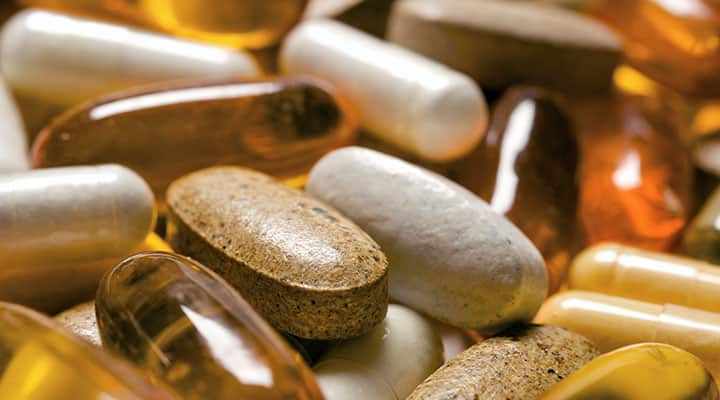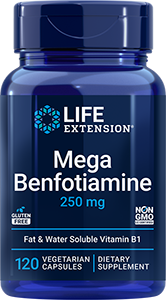
Benfotiamine vs. Thiamine: What's the Difference?
Published: May 2023
Have you ever taken a look at the nutrition facts on a cereal box? Beyond the usual suspects, there are probably ingredients that might look familiar to you, even if they're just familiar in name. And there's a good chance one of those ingredients is thiamine.
If you don't know exactly what thiamine does or why it's included on so many labels, it might be time to find out—because this B-vitamin and its supercharged form, benfotiamine, pack a punch when it comes to the health benefits they provide!
What is thiamine?
We all know B-vitamins are great for keeping your body and mind healthy, but it's time to shine the spotlight on vitamin B1, aka thiamine. It was the first B vitamin to be discovered (hence the name) and like the rest of the vitamins in the vitamin B family, helps convert food into fuel for energy. Thiamine is water-soluble and can't be made on its own, so avoiding deficiency through regular consumption of this vitamin is vital to maintaining your best health.
Typically, we have about 25-30 mg of thiamine circulating throughout our bodies at any given time, with 80% of it in a form called thiamine diphosphate. This thiamine derivative is what supplements get converted to in the body and is the most metabolically active form of this type of B1. Thiamine diphosphate plays a role as an essential cofactor (or a helper molecule) for five different enzymes that are involved in the healthy metabolism of glucose, amino acids and lipids in the body. And these essential functions play an even bigger part in thiamine's many health benefits, including:
Maintaining cognitive function and neurological health
—Thiamine is well known for supporting your memory and keeping your brain operating at its peak form, so avoiding a vitamin B1 deficiency is essential for your noggin. It also supports healthy nerve function.Supporting healthy glucose metabolism
—Because of its role in metabolizing glucose, amino acids and lipids, this nutrient helps convert carbohydrates into usable energy, which in turn supports healthy blood sugar levels.Promoting cardiovascular health
—Taking thiamine routinely may also support blood vessel health and promote the healthy function of endothelial cells, making it easier to keep your ticker healthy for the long haul.Protecting against advanced glycation end products (AGEs)
—One of the biggest obstacles in your anti-aging efforts are advanced glycation end products, appropriately shortened to AGEs. These compounds are formed when proteins and fats combine with sugar in the bloodstream. They can potentially impact several aspects of your health, including your healthy blood sugar levels. Thiamine can help protect against the formation of these compounds.
How much thiamine do you need?
The amount of thiamine you need varies by age and sex, with the recommended dietary allowances varying between 1-1.2 mg per day. Thiamine is water-soluble, so while this vitamin and its beneficial effects are carried to the tissues throughout the body, it unfortunately can't be stored for long periods of time and will be filtered out.
Because of that, humans require a continuous supply of B1 in their diet—through food or in supplement form (you can find it in both standalone and multivitamin formulas)—especially if you want to maintain healthy thiamine levels and reap all this nutrient's benefits. Most vitamin B1 supplements contain a form called thiamine hydrochloride.
About half of thiamine in the American diet comes from food that naturally contains the vitamin, but vitamin-enriched foods are also common, with breads and cereals especially known for being fortified with thiamine. Talk about having your vitamins and eating them, too! Other foods high in thiamine include salmon, pork, black beans, grains/cereals, seaweed, flax, certain nuts and seeds and more. Lucky for us, between dietary and supplement intake, the average American is able to get enough thiamine.
Where Do Vitamins Come From?
Have you ever wondered how vitamins got their name? And did you know that thiamine was not only the first B vitamin to be discovered, it was actually the first vitamin to be discovered?
In 1911, a Polish biochemist named Casimir Funk coined the word "vitamins" to refer to substances that are required in small amounts to maintain overall health. This word is a combination of two words: "vital," aka necessary, and "amines," a nitrogen-containing group found in organic molecules. While research has since found that not all vitamins actually include amines, it goes without saying that the name stuck.
The rest is history—literally! In 1913, researchers at the University of Wisconsin identified two species of vitamins: "fat-soluble factor A" and "water-soluble factor B." From that point on, scientists and researchers were hard at work discovering the specific compounds that constitute vitamins. In 1926, the first vitamin was isolated, the one we now know as thiamine, or vitamin B1. By 1936, vitamin B1 was synthesized, leading to the prominence of vitamin-enriched foods and eventually B1 (and other vitamins) in the form of dietary supplements.
Explore Our Best Glucose Management / Blood Sugar Supplements
What is benfotiamine?
Thiamine is a great vitamin and, as we covered, essential for several processes in the body. But what if you're looking for something that can provide all the benefits of thiamine, but in a high-dose version? You're in luck! That's exactly what benfotiamine is—a "supercharged" thiamine derivative.
Benfotiamine is a synthetic form of vitamin B1 that is fat-soluble as opposed to water-soluble. Fat-soluble nutrients tend to have better absorption and won't be filtered out at the same rate as water-soluble nutrients.
Because fat-soluble vitamins build up to higher levels in the body, benfotiamine's bioavailability far surpasses that of thiamine, allowing it to reach higher levels in your cells. And because this nutrient stays in your bloodstream for longer periods of time, it allows you to make use of the benefits for longer periods of time.
You should expect to find all the benefits of thiamine in benfotiamine, too. And because of its additional properties, benfotiamine may be more supportive for certain health needs. It is especially helpful for keeping your cognitive function at its peak form and for protecting you against oxidative stress and advanced glycation end products.
It also plays a big role in its benefits to your metabolism and fighting metabolic related challenges. Due to its better bioavailability compared to its counterpart and benfotiamine's ability to reach cell membranes more easily than thiamine, this form of B1 may also be easier to use to help maintain your healthy metabolism of glucose.
What foods contain benfotiamine?
We already know foods are a great source of thiamine—it may even be in some of your favorite foods! However, you won't be able to find benfotiamine in those same foods. In fact, you can't find benfotiamine in food (or nature) at all. The only way you'll be able to make use of this powerful version of B1 is through supplementing. Remember, though, even though this version of B1 is fat-soluble, we still can't produce it on our own. So, if you choose to supplement with benfotiamine, continual supplementation is recommended to keep you at your best health.
Pro tip: As is the case with many fat-soluble nutrients, it's best to take benfotiamine with food.
Is benfotiamine the best form of vitamin B1?
It would be a disservice to say that one variation of B1 is better than the other! They're just different. Think of benfotiamine as thiamine that is supercharged or boosted—it has some of the same beneficial effects as its water-soluble counterpart, but this lipid-soluble form can build up to higher levels in your body.
To put it simply, because absorption of benfotiamine is higher, it's a great way to get the benefits of thiamine in higher concentrations, allowing it to stay in your body longer while providing extra support for anti-aging, brain health and healthy levels of blood sugar. It can also be helpful for avoiding any B1-related deficiencies you might experience.
Can you take benfotiamine and thiamine together?
You might be wondering: if the B-vitamins are so important to whole-body health, why not just take a B-complex? Since most types of complexes only include thiamine and not benfotiamine, a benfotiamine supplement that provides both of these forms of vitamin B1 alongside a B-complex might be your best bet to get the most out of all of these nutrients.
And the good news is that you don't have to worry about taking high doses or overdoing your B intake. These supplements are well tolerated when taken together and provide a variety of health benefits to boot!
If you're looking for other ways to support your health needs, including healthy glucose metabolism, try a quiz to help identify the nutrients that might be right for you.
References
- Arora, Subodh, et al. "Thiamine (vitamin B1) improves endothelium-dependent vasodilatation in the presence of hyperglycemia." Ann Vasc Surg. September 2006. https://pubmed.ncbi.nlm.nih.gov/16741654/
- Pan, Xiaoli, et al. "Long-Term Cognitive Improvement After Benfotiamine Administration in Patients with Alzheimer's Disease." Neurosci Bull. December 2016. https://pubmed.ncbi.nlm.nih.gov/27696179/
- "Thiamin." Data on file.
- "Thiamin Fact Sheet for Health Professionals." National Institutes of Health. https://ods.od.nih.gov/factsheets/Thiamin-HealthProfessional/
- "The Vitamin B Complex." American Chemical Society. December 2016. https://www.acs.org/education/whatischemistry/landmarks/vitamin-b-complex.html
Always be in the know!
Access the latest deals, wellness news, expert health tips & more!









